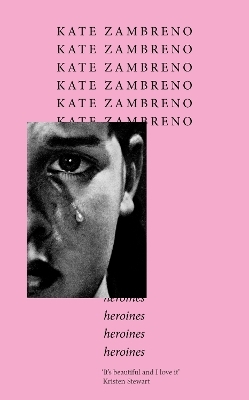
Heroines
The essential feminist manifesto and ‘One of the 50 greatest books by women’ (Buzzfeed): ‘Sharp, finely-structured, and meticulously researched’ Maggie Nelson
Seiten
2024
Corsair (Verlag)
978-1-4721-5945-8 (ISBN)
Corsair (Verlag)
978-1-4721-5945-8 (ISBN)
A manifesto reclaiming the wives and mistresses of literary modernism that inspired a generation of writers and scholars, reissued with a new introduction after more than a decade.
'I am beginning to realize that taking the self out of our essays is a form of repression. Taking the self out feels like obeying a gag order - pretending an objectivity where there is nothing objective about the experience of confronting and engaging with and swooning over literature'
On the last day of December 2009 Kate Zambreno, then an unpublished writer, began a blog arising from her obsession with literary modernism. Widely shared on social media, Zambreno's blog became an outlet for her highly informed and passionate rants and melancholy portraits of the fates of the modernist 'wives and mistresses,' reclaiming the traditionally pathologized biographies of Vivienne Eliot, Jane Bowles, Jean Rhys, and Zelda Fitzgerald: writers and artists themselves who served as male writers' muses only to end their lives silenced, erased, and institutionalized. Over the course of two years, her blog helped create a community of writers and devised a new feminist discourse of writing in the margins and developing an alternative canon.
In Heroines, Zambreno extends the polemic she began online into a dazzling, original work of literary scholarship. Combing theories that have dictated what literature should be and who is allowed to write it - she traces the genesis of a cultural template that consistently exiles feminine experience to the realm of the 'minor,' and diagnoses women for transgressing social bounds. 'ANXIETY: When she experiences it, it's pathological,' writes Zambreno. 'When he does, it's existential.'
With Heroines, Zambreno provided a model for a newly subjectivized criticism, prefiguring many group biographies and forms of autotheory and hybrid memoirs that were to come in the years to follow.
'I am beginning to realize that taking the self out of our essays is a form of repression. Taking the self out feels like obeying a gag order - pretending an objectivity where there is nothing objective about the experience of confronting and engaging with and swooning over literature'
On the last day of December 2009 Kate Zambreno, then an unpublished writer, began a blog arising from her obsession with literary modernism. Widely shared on social media, Zambreno's blog became an outlet for her highly informed and passionate rants and melancholy portraits of the fates of the modernist 'wives and mistresses,' reclaiming the traditionally pathologized biographies of Vivienne Eliot, Jane Bowles, Jean Rhys, and Zelda Fitzgerald: writers and artists themselves who served as male writers' muses only to end their lives silenced, erased, and institutionalized. Over the course of two years, her blog helped create a community of writers and devised a new feminist discourse of writing in the margins and developing an alternative canon.
In Heroines, Zambreno extends the polemic she began online into a dazzling, original work of literary scholarship. Combing theories that have dictated what literature should be and who is allowed to write it - she traces the genesis of a cultural template that consistently exiles feminine experience to the realm of the 'minor,' and diagnoses women for transgressing social bounds. 'ANXIETY: When she experiences it, it's pathological,' writes Zambreno. 'When he does, it's existential.'
With Heroines, Zambreno provided a model for a newly subjectivized criticism, prefiguring many group biographies and forms of autotheory and hybrid memoirs that were to come in the years to follow.
Kate Zambreno is the author of nine books, most recently The Light Room, a meditation on art and care. Her writing has appeared in The Paris Review, Granta, BOMB, Astra, VQR, and elsewhere. She teaches in the graduate nonfiction program at Columbia University. She is the 2021 Guggenheim Fellow in Nonfiction.
| Erscheinungsdatum | 22.08.2024 |
|---|---|
| Verlagsort | London |
| Sprache | englisch |
| Maße | 126 x 196 mm |
| Gewicht | 254 g |
| Themenwelt | Geisteswissenschaften ► Sprach- / Literaturwissenschaft ► Anglistik / Amerikanistik |
| Geisteswissenschaften ► Sprach- / Literaturwissenschaft ► Literaturwissenschaft | |
| Sozialwissenschaften ► Soziologie ► Gender Studies | |
| ISBN-10 | 1-4721-5945-4 / 1472159454 |
| ISBN-13 | 978-1-4721-5945-8 / 9781472159458 |
| Zustand | Neuware |
| Haben Sie eine Frage zum Produkt? |
Mehr entdecken
aus dem Bereich
aus dem Bereich
Poetik eines sozialen Urteils
Buch | Hardcover (2023)
De Gruyter (Verlag)
CHF 83,90
Entzauberung und Faszination des Immergleichen in Literatur und Film
Buch | Softcover (2024)
Springer Fachmedien Wiesbaden GmbH (Verlag)
CHF 118,95
Buch | Softcover (2024)
belleville (Verlag)
CHF 27,95


